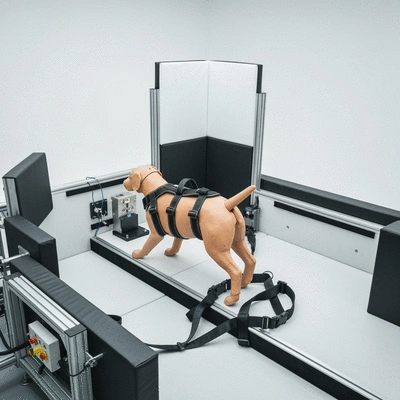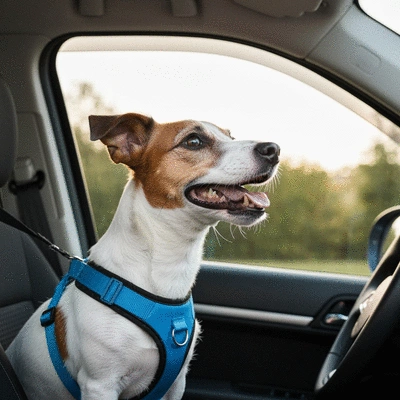
When it comes to your dog's safety during car rides, understanding the significance of crash-tested dog harnesses can be a game-changer. These specialized harnesses are not just about comfort; they are crucial for protecting your furry friends in case of an accident. Let's explore the vital information you need to know for making informed choices to ensure your pet's safety on the road.
Understanding the key certifications and safety ratings for crash-tested dog harnesses can significantly impact your pet's safety during car travel. Below is a summary of what to look for when choosing a harness.
Have you ever considered what might happen to your furry friend during a car accident? It's a thought that can make any pet owner anxious. That's why understanding the importance of crash-tested dog harnesses is crucial for ensuring your dog's safety on the road. These specialized harnesses are designed with standards that go beyond regular pet gear to protect your loyal companion during car travel.
When we talk about safety in vehicle travel, we’re not just discussing comfort; we’re diving into a realm where lives are at stake! A well-designed harness can be the difference between a safe journey and a tragic incident. At Dog Seat Belts, we believe that every dog deserves a secure place in your vehicle, and that's why we're passionate about educating pet owners on the best options available. The Centers for Disease Control and Prevention (CDC) also provides valuable information on healthy pet travel, emphasizing the importance of safe practices for pets on the go.

Crash-tested safety standards are essential to ensure that harnesses can withstand the forces of sudden stops or accidents. These tests simulate real-life crash scenarios, evaluating how well a harness can protect your dog. Investing in a harness that adheres to these safety standards not only provides peace of mind but also plays a vital role in safeguarding your pet during the ride. Some states even have laws requiring dogs to be harnessed in cars, highlighting the legal and safety aspects of proper pet restraint.
Choosing a crash-tested harness is not just about having a piece of equipment; it’s about making a commitment to your dog's safety. I often tell pet owners that taking the time to research these standards can save lives, and it’s one of the most responsible choices you can make as a pet parent!
When evaluating crash-tested dog harnesses, it’s crucial to look for the right certifications that indicate the harness has met specific safety standards. Here are some of the key certifications to prioritize:
Being informed about these certifications can help you make better purchasing decisions. At Dog Seat Belts, we emphasize the need to choose products that have been thoroughly tested to guarantee the utmost safety for your canine companions.
Crash testing involves subjecting dog harnesses to various impact scenarios to evaluate their effectiveness in protecting pets during accidents. These tests give harnesses safety ratings that indicate their reliability under specific conditions. Familiarizing yourself with these ratings can be a game-changer when selecting the right harness for your dog.
When investing in a dog harness, I always suggest checking its crash test ratings. This not only improves your confidence in the product but also enhances your dog’s security while traveling. Remember, safety is not an expense; it’s an investment in your pet’s well-being!
When choosing a crash-tested dog harness, always prioritize those that have undergone independent safety certifications like ASTM F2020 or FMVSS 213. These certifications ensure that the harness can withstand the forces experienced during a car accident, providing the best possible protection for your furry friend.
As a pet owner, making informed choices about your furry friend's safety is essential, especially when it comes to harnesses. At Dog Seat Belts, I believe that understanding the differences across brands can empower you to choose the best for your pup. Here’s a summary of key features that set these harnesses apart, ensuring both safety and comfort.

When evaluating dog harnesses, there are several features to keep in mind. Here’s a quick overview of what to look for:
These features not only enhance safety but also improve your dog's overall travel experience. Remember, a happy dog makes for a happy ride!
Choosing the right harness involves more than just picking a popular brand. Here are important factors to consider:
By taking these factors into account, you can select a harness that truly meets your dog's needs and enhances their safety on the road.
Consumer reviews are a treasure trove of information! Hearing from other pet owners can help you gauge the effectiveness of a harness in real-world situations. Here are some common themes from reviews:
Reading through these reviews can provide valuable insights to help you make a well-rounded decision for your dog's safety and comfort!
Here is a quick recap of the important points discussed in the article:
Dedicated to enhancing pet safety during car travel, we provide comprehensive reviews, installation guides, and essential tips for responsible pet owners. Join us in making every journey safe and enjoyable for your furry friend.
